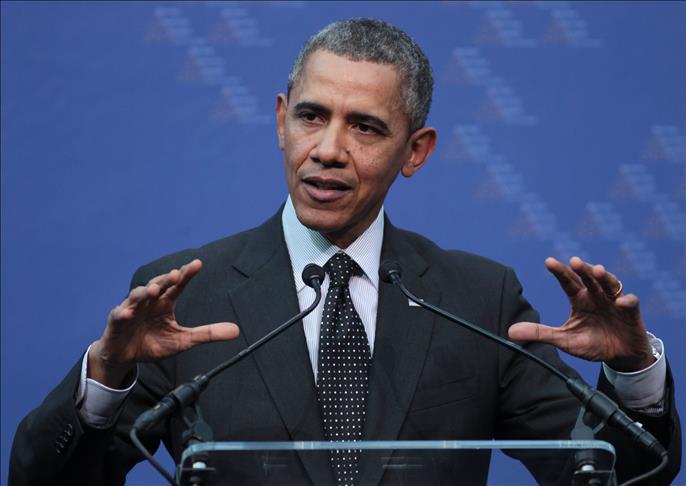
MANILA
On the final day of his weeklong trip to Asia, President Barack Obama continued to reflect Tuesday on the enduring alliance between the U.S. and its former colony, the Philippines.
The president - speaking in the morning in the Philippines' capital, Manila - told an audience of American and Filipino military at Fort Bonifacio, a former military base, that deepening the alliance "is part of our broader vision for the Asia Pacific."
"We believe that nations and peoples have the right to live in security and peace and have their sovereignty and territorial integrity respected," Obama said, before participating in a wreath laying ceremony to honor fallen soldiers at the Manila American Cemetery.
The Philippines is the last stop of his Asia tour, after visits to Japan, South Korea and Malaysia. The trip is part of a U.S. bid to rebalance forces in the region amid a perceived threat from China's increasing military and political might.
"We believe that international law must be upheld... that disputes must be resolved peacefully and not by intimidation or force, that’s what our nations stand for and that’s the future we are working for, and that’s why your service is more important," the U.S. president said.
Obama - on a two-day visit to the country, the first by an American President in 11 years - paid tribute to the Filipino soldiers who fought alongside the U.S. military during the many battles of World War II, and recognized the injustice that so many of the "hundreds of thousands of Filipinos [who] fought under the American flag" had to wait for compensation for their efforts.
“Together Filipinos and Americans... endured the agony of Death Marches and the horror of the prisoner of war camps. Many never made it out," he said, addressing the thousands of troops and veterans present. "The proud service of many of these Filipino veterans was never fully recognized by the United States. Many were denied the compensation they’ve been promised, it was an injustice.""
During the war, U.S. President Franklin D. Roosevelt said Filipinos who fighting a common enemy would receive the same benefits as U.S. veterans, but when President Harry Truman signed the 1946 Rescission Act, for most the promise was taken away.
Though the U.S. gave no official explanation at the time, the Philippines' Undersecretary of Veteran Affairs Ernesto Carolina told this reporter in 2010 that he believed in the postwar years the U.S. could not afford to pay up as it needed money for reconstruction.
"There were so many [Filipinos] fighting that they would have had to pay at least US$6 billion," he said.
On Tuesday, Obama highlighted that in recent years his administration had worked to pass a law, process claims and give compensation for nearly 20,000 Filipino vets and their families.
“It was the right thing to do,” he said.
He asked some of the WWII veterans, resistance fighters and prison camp survivors present at the military base to wave or stand, the President saluting their efforts: “The loss of life was grievous and hardly a Filipino family was untouched by the tragedy. But the heroic struggle brought out the best in the Filipino character in the face of adversary and served as a beacon to freedom loving peoples everywhere."
Obama then addressed the younger generations present, saying “The spirit of these veterans, their strength, their solidarity, I see it in you as well. When you train and exercise together to say ready for the future.”
The extensive and in depth cooperation between American and Filipino military and civilians in the aftermath of typhoon Haiyan was cited as a example of “What friends can do when we take care of each other.”
In November 2013, Typhoon Haiyan, known as Typhoon Yolanda in the Philippines, devastated portions of Southeast Asia, particularly the Philippines, the U.S. playing a major role in helping the country rebuild.
Referring to an Enhanced Defense Cooperation pact signed prior to his Monday arrival, Obama said: “American forces can begin rotating through Filipino airfields and ports.""
"We will train & exercise together to bring our militaries even closer and support your efforts to strengthen your armed forces”
Since 1999, hundreds of American forces have held counterterrorism exercises with local troops battling militants in the country's Muslim south. The new agreement allows for a larger U.S. military presence
“This treaty means our two nations pledged... our common determination to defend themselves against external armed attacks so that no potential aggressor could be under the illusion that either of them stands alone."
Before leaving the continent, Obama also stopped to inspect a prototype of the Comet, an electric city bus being built by U.S. and local investors. Starting next month, 15,000 Comets will replace 30,000 jeepneys, or “mini buses” in the jammed streets of Manila.
He boarded Air Force One 11:16 a.m. local time at Ninoy Aquino International Airport (NAIA) and left for the U.S. at 11:28 am. Reports said Air Force One will make a pit stop in Anchorage, Alaska to refuel then proceed to Washington D.C.
englishnews@aa.com.tr

